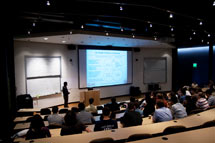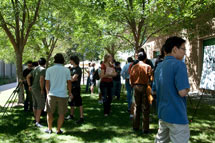
Handy Links
SLAC News Center
SLAC Today
- Subscribe
- Archives: Feb 2006-May 20, 2011
- Archives: May 23, 2011 and later
- Submit Feedback or Story Ideas
- About SLAC Today
SLAC News
Lab News
- Interactions
- Lightsources.org
- ILC NewsLine
- Int'l Science Grid This Week
- Fermilab Today
- Berkeley Lab News
- @brookhaven TODAY
- DOE Pulse
- CERN Courier
- DESY inForm
- US / LHC
SLAC Links
- Emergency
- Safety
- Policy Repository
- Site Entry Form

- Site Maps
- M & O Review
- Computing Status & Calendar
- SLAC Colloquium
- SLACspeak
- SLACspace
- SLAC Logo
- Café Menu
- Flea Market
- Web E-mail
- Marguerite Shuttle
- Discount Commuter Passes
-
Award Reporting Form
- SPIRES
- SciDoc
- Activity Groups
- Library
Stanford
Around the Bay
Graduate Students Preview SLAC Research Options
Last Thursday, SLAC faculty and staff hosted about 40 incoming graduate students from the Stanford physics and applied physics programs, introducing them to research opportunities available at the lab. The students heard to presentations about accelerator physics, photon science, particle physics and cosmology; toured several lab facilities; and chatted with current graduate students and faculty about ongoing research.
Along with presentations and tours, the day included two poster sessions—a new addition to the orientation program this year—where students learned about different research programs from current graduate students. The event showcases SLAC science for the students, who spend the majority of their first year taking classes and working with different groups both at the university and at SLAC.
"The idea is to have us do rotations so we can get a sense for all the different research," said Ryan Hamerly, who graduated last spring from Caltech with a degree in physics, but isn't quite sure what his focus will be at Stanford.
Kristiana Schneck, who graduated from MIT with a degree in physics, is mostly interested in the research offered at the Kavli Institute of Particle Astrophysics and Cosmology. "I'll probably do rotations in dark energy, CDMS, then something completely different to just see what else is going on," she said. Having the opportunity to work in many different areas helps students determine where they want to focus their thesis work.
SLAC researchers and graduate students touted the unique opportunities at SLAC, such as the Linac Coherent Light Source and Facilities for Advanced Accelerator Experimental Tests. The staff also stressed that graduate students play an important role in many research groups at the lab, practicing theoretical, computational and experimental—often award-winning—research.
—Lauren Rugani
SLAC Today, September 21, 2010

